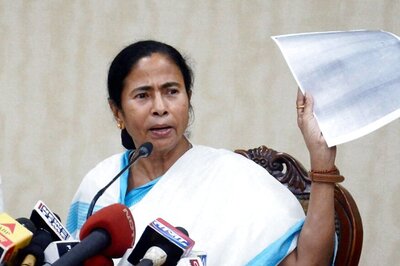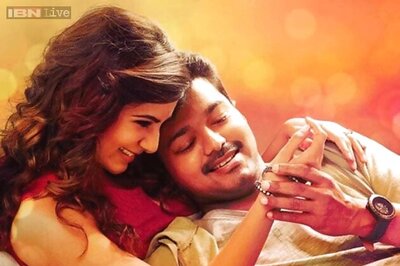
views
This article contains spoilers for the film Haseen Dillruba.
At first glance, the women in Kanika Dhillon’s films are unforgettable. They are beautiful, smart, sexy, headstrong and never conform to the rules levied on them by the world. They always appear to have control over their own stories, which are often unlike anything we’ve heard before.
But something happens to them by the third act of their stories, when someone else takes over their lives, be it a villain with a vengeance (Judgemental Hai Kya?), or their lovers who have finally risen to the occasion a la Manmarziyaan. While we root for the Rumis, Bobbys and the Mukus in Kanika’s stories, it is often someone else, often the men who take over the narrative, and in the process their lives. And we end up scratching our heads wondering when that happened.
In Kanika’s latest work, the genre-bending Haseen Dillruba, directed by Vinil Matthew, her protagonist Rani Kashyap (Taapsee Pannu) is in charge for most part of the movie. In the timeline, only Rani exists, who narrates the tale of her bumpy relationships with her dead husband Rishu and missing ex-lover Neel. But soon enough, we find out that Rani is not really the protagonist we thought she was. She is a partner in this game, at best, and a pawn at worst.
Rani is the prime suspect in the murder of her husband Rishu (Vikrant Massey), a shy engineer from the fictitious town of Jwalapur. After Rishu’s body is found burnt to a crisp, she is summoned to the police station, where she narrates her story in front of an officer who is sure that she murdered him.
For the most part of their married life, which is less than six months, Rani says she was unhappy because Rishu was meek and timid, not the tall, dashing and mysterious man she wanted in her life. She chose to marry him because the other match offered for her was that of a bald man.
Rani is a headstrong Delhi girl who spends time reading “mystery” novels by writer Dinesh Pandit. Her idea of life is highly influenced by his work. So when she finds out that she won’t be living in a romance novel, but in reality, she becomes very unhappy. To make matters worse, Rishu cannot even consummate their marriage properly.
However, she still tries to get on with her life when Neel (Harshvardhan Rane), Rishu’s ‘favourite’ cousin, gatecrashes it. A beefcake of a man, Neel is everything that Rishu is not. He is confident, hunky and adventurous. He jumps into the water when Rani falls off her raft, while her husband looks on. He is also sexist, who equates her worth with the quality of tea she makes. Needless to say, she is quickly seduced.
This is when Rani starts becoming an ‘Adarsh Bahu’, who goes on from not knowing how to make tea to making mutton within a few days, for the sake of her lover. However, when Neel finds out that she is serious about him, he flees. Rani, with a hurt pride, tells Rishu about the affair matter-of-factly.
When the police officer interjects to ask if she had any regret about having an affair, she says, “No. Because if I hadn’t met Neel, I wouldn’t have met the real Rishu.” This is when the film starts getting weird. Rishu, who was a timid man till then, takes a dip (literally) to become a psychotic, murderous sadist. Rani falls down a flight of stairs on one occasion and on the other almost gets burned on the stove.
She tells the entire police station, who has by now, gathered to listen to her speak, that it isn’t really love if it isn’t coloured in blood. Rani gets to live her Dinesh Pandit fantasy, and hence, she says, she falls head over heels in love with her husband.
Even the biggest romantic should draw the line at three life-threatening events right? But Rani doesn’t, as her loyalty towards Rishu deepens with every ‘accident.’ In a way, it is two psychos who have met their match.
However, it is not just the romanticized domestic abuse which depicts the lack of female agency in Haseen Dillruba. It is the big climax that takes away all the power from Rani.
When Rani walks out of the police station after months of questioning, fooling the officers and even polygraph examiner, we think she has gotten away with murder. It appears that Rani, despite telling the police she was in love with her husband, had enough of his abuse and killed him. It could have been a perfect ending, a vindication of sorts for someone going through repeated abuse.
However, we find out later, that it is actually Neel who is dead and not Rishu. On that fateful day, Neel comes to their house and threatens to leak intimate videos of Rani on the internet. An already angry Rishu then starts hitting Neel. Neel overpowers Rishu and almost chokes him to death when Rani hits him on the head with a mutton leg. Neel is immediately dead.
To cover-up the murder, Rishu then decides to re-enact the plot of a Dinesh Pandit novel. He first cuts Neel’s hand, then (in a gruesome scene) his own and then sends Rani to the butcher to establish an alibi and get rid of the murder weapon.
Once Rani is gone, he sets up an explosion and escapes using the back exit. He swims in the river that is conveniently behind their house, and almost drowns. For the police officer, who uncovers this while reading said Dinesh Pandit novel, that is the end of Rishu.
That is not the case, in the end we actually see Rani and Rishu reunite, as they make their great escape. A fitting end to the twisted love story perhaps.
However, this also means that Hasseen Dillruba, is actually not about, well, the ‘haseen dillruba’. Throughout the film we get teased about the mysterious femme fatale, who at the end seems to be reduced to a submissive, albeit masochist, woman.
As an audience member, it would have been chilling to watch Rani murder her husband and getting away with it. On the other hand, if Neel was the one who was supposed to be dead anyway, then why waste the perfect opportunity to show Rani as a calculated psychopath who turns cold in the face of adversity. It would have been fun to see Rani hatch the plan, and manipulate Rishu to go through with it.
Instead we saw a very scared Rani, who was made to take part in a plan by her hero lover, who rose to the occasion to save her. The male saviour complex is real with this one.
Rani really did not have time to think it through or oppose the plan, and then had to face the consequences after he disappeared. She was on the verge of spending her life in jail and only got away because of the botched polygraph exam, which practically is never real evidence. All of it would have been worth it, had it really been for her.
When Rishu takes control over the situation, he also takes control over Rani’s life. It is futile to discuss whether Rani should have left Rishu, because she doesn’t after repeated abuses. But she loses the little agency she has in the climax by choosing to get together with him.
We can pick apart the story of the film as much as we want to. We can argue that they could have dumped Neel’s body on the river that was accessible to them. However, it doesn’t change that Haseen Dillruba is a story about twisted, damaged and dysfunctional people. We just wish it was Rani who had the last laugh.
Read all the Latest News, Breaking News and Coronavirus News here.




















Comments
0 comment